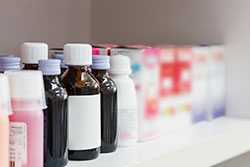Managing Travelers’ Diarrhea While Traveling Abroad

What do you do if you find yourself with a rumbling tummy while traveling overseas? Follow these tips to prevent or treat travelers’ diarrhea and still enjoy your international trip.
What is it?
Travelers’ diarrhea is caused by a variety of pathogens but most commonly bacteria found in food and water, often related to poor hygiene practices in local restaurants. An estimated 30% to 70% of travelers experience travelers’ diarrhea, depending on where they go and what time of year. Countries are generally divided into 3 risk groups: high, intermediate, and low.
- Destinations with high risk: Asia, the Middle East, Africa, Mexico, and Central and South America.
- Destinations with intermediate risk: Eastern Europe, South Africa, and some Caribbean islands.
- Destinations with low risk: the United States, Canada, Australia, New Zealand, Japan, and Northern and Western Europe.
Prevention
You can reduce your risk of travelers’ diarrhea by staying away from the bacteria that cause it. Adults may also take an antacid medicine (e.g., Pepto-Bismol*, the equivalent of two 262-mg tabs 4 times a day), which can decrease the incidence of travelers’ diarrhea up to 50%. However, Pepto-Bismol is not recommended for pregnant women or children aged 3 years or younger.
Keep your hands clean.
Wash your hands often with soap and water or use an alcohol-based hand sanitizer after using the bathroom and before eating. Good hand hygiene prevents the spread of germs.
Eat and drink safely.
Stick to safe food and water habits. Some tips include:
- Eat food that is cooked and served hot, fruits and vegetables you have washed in clean water or peeled yourself, and pasteurized dairy products.
- Don’t eat food served at room temperature, food from street vendors, or raw or undercooked (rare) meat or fish.
- Drink bottled water that is sealed, ice made with bottled or disinfected water, and bottled or canned carbonated drinks.
- Don’t drink tap or well water or drinks with ice made with tap or well water or unpasteurized milk.

Drink lots of fluids.

Over-the-counter medicines can help ease symptoms.
Treatment
If you find yourself suffering from travelers’ diarrhea, here are some things you can do to manage it.
Mild diarrhea can be tolerated, is not distressing, and does not prevent you from participating in planned activities. To treat mild diarrhea:
- Drink lots of fluids to prevent dehydration.
- Take over-the-counter medications such as loperamide (e.g., Imodium) to manage symptoms. These medicines can help decrease the number of times you need to go to the bathroom, making it easier to ride on an airplane or bus. Always consult a health-care provider before giving over-the-counter medications to infants or children. Pregnant women and children aged 3 years or younger should avoid medicines containing bismuth, such as Pepto-Bismol or Kaopectate.
Moderate diarrhea is distressing and can interfere with your planned activities. To treat moderate diarrhea:
- Drink lots of fluids to prevent dehydration. Oral rehydration salt is widely available in stores and pharmacies in most countries. Mix as directed in clean water.
- Take over-the-counter medications such as loperamide (Imodium) to manage symptoms. Pregnant women and children aged 3 years or younger should avoid medicines containing bismuth, such as Pepto-Bismol or Kaopectate.
- Consider taking an antibiotic if your doctor has prescribed you one.
Severe diarrhea is debilitating and completely prevents you from participating in planned activities. To treat severe diarrhea:
- Take antibiotics if prescribed by your doctor.
- You can also take over-the-counter medicines to manage symptoms.
- Stay hydrated by drinking lots of fluids, such as oral rehydration solution.
- Seek health care if you are unable to tolerate fluids or if you develop signs of dehydration. It is especially important to look out for signs of dehydration in infants and young children.
Travelers’ diarrhea can make international travel unpleasant. Following the treatment advice can help resolve symptoms within just a few days, so you can get back to enjoying your trip.
*Use of trade names is for identification only and does not imply endorsement by the Centers for Disease Control and Prevention.
- Page last reviewed: July 24, 2017
- Page last updated: July 24, 2017
- Content source:
- National Center for Emerging and Zoonotic Infectious Diseases, Division of Global Migration and Quarantine
- Page maintained by: Office of the Associate Director for Communication, Digital Media Branch, Division of Public Affairs




 ShareCompartir
ShareCompartir